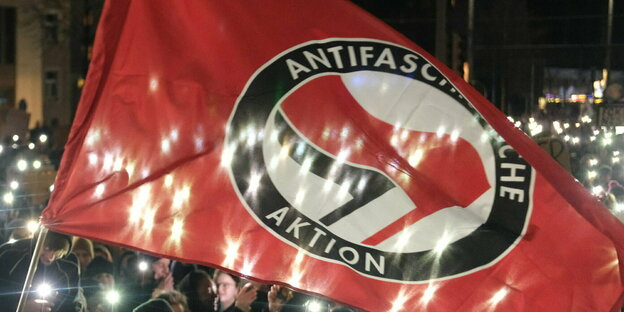A trial against German anti-fascists begins in Budapest on Monday. The families of the accused reject extradition to Hungary.

Antifa flag at a demonstration against the right (symbolic image) Photo: Sebastián Willnow/dpa
SEDAN taz | It is “fear” for their children that leads the parents of the anti-fascists accused in the Budapest trial to speak publicly. On Saturday at a press conference in Berlin they presented an open letter also addressed to the public prosecutor's offices in Berlin and Dresden, as well as the Berlin Court of Appeal. In it they speak out against extradition to Hungary. They write: “There is a risk of serious psychological and physical harm with imprisonment and sentencing in Hungary.” Support for their cause also comes from ten criminal defense lawyers who have issued a statement calling for criminal proceedings to be initiated in Germany.
A year ago, anti-fascists attacked several neo-Nazis as part of the neo-fascist Day of Honor in the Hungarian capital. Of the 15 accused, 12 are German. The trial begins on Monday in Budapest against one of them and an Italian woman, with the threat of long prison terms. While most of the accused have gone into hiding, Hungary has requested the extradition of two suspects who were arrested in December and are in prison in Dresden and Milan.
Wolfram Jarosch, father of the imprisoned Maja T. from Jena, stated that his daughter “has the right to a fair trial and this can only take place in Germany.” He is proud that Maja is “committed to fighting fascism in these times,” but the “presumption of innocence” is still valid. There was a threat of “inhumane conditions” in the Hungarian prison. This is how the Italian woman describes it in a letter that she has been imprisoned there for a year. According to Jarosch, they denounce unsustainable hygienic conditions, prohibition of contact and malnutrition. There is also the risk of particularly high penalties.
At the beginning of January, the Berlin Public Prosecutor's Office requested the execution of the European arrest warrant against Maja T. issued in Hungary. The Court of Appeals is currently negotiating this. Only in the next step will a decision be made on the execution of the extradition.
Maja's lawyer, Sven Richwin, criticized the poor knowledge of the investigation files. Due to the lack of independence of Hungarian judges and a “penal system that aims to deter,” Richwin is also clear: “There is no fair trial in Hungary.”
The lawyers also criticize the German authorities: “they would present a false image of anti-fascists who supposedly act from underground” and would create a “new RAF.” This is intended to legitimize “the options of repression and investigation.”